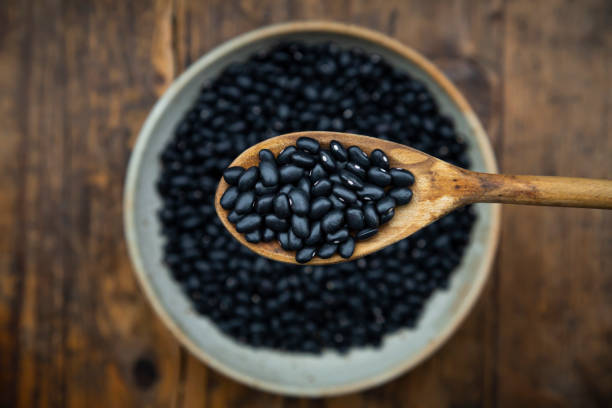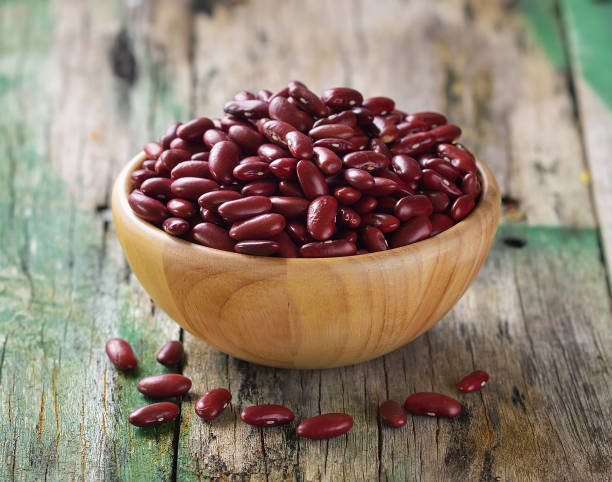by Jasmine Farrell
July is national baked bean month! Rice and beans, three-bean salad, bean burrito, you know… In the quest for a healthier lifestyle, it’s crucial to pay attention to our dietary choices. One category of food that often goes unnoticed but holds incredible potential for improving our fiber intake and overall health is beans. What better way to honor national baked bean month than incorporating more beans into your diet? The humble legumes are not only delicious but also offer a plethora of benefits. Check out three beans that are rich in fiber and provide a wide range of health advantages. Incorporating these nutritious beans into your diet can help optimize digestion, manage weight, and support overall well-being.

Black Beans: The Fiber Powerhouse
Black beans are an excellent choice for boosting your fiber intake and promoting digestive health. These small wonders are packed with soluble and insoluble fiber, making them a fantastic addition to any diet.
Soluble fiber, found abundantly in black beans, forms a gel-like substance in the digestive system. This gel helps slow down the digestion process, promoting a gradual release of sugars into the bloodstream and helping stabilize blood sugar levels. Additionally, soluble fiber aids in reducing cholesterol levels, lowering the risk of heart disease.
On the other hand, insoluble fiber adds bulk to the stool, facilitating regular bowel movements and preventing constipation. It promotes a healthy digestive system and supports the growth of beneficial gut bacteria, contributing to a balanced gut microbiome.
Black beans also boast a rich nutritional profile, including vitamins, minerals, and antioxidants. They are a great source of plant-based protein, making them an ideal choice for vegetarians and vegans. Protein is essential for tissue repair, muscle growth, and overall health.
On the other hand, insoluble fiber adds bulk to the stool, facilitating regular bowel movements and preventing constipation. It promotes a healthy digestive system and supports the growth of beneficial gut bacteria, contributing to a balanced gut microbiome.
Black beans also boast a rich nutritional profile, including vitamins, minerals, and antioxidants. They are a great source of plant-based protein, making them an ideal choice for vegetarians and vegans. Protein is essential for tissue repair, muscle growth, and overall health.

Chickpeas: Versatility and Fiber
Chickpeas, also known as garbanzo beans, are incredibly versatile legumes that can significantly enhance your fiber intake. These tiny (also cute), round legumes are widely popular and can be used in a variety of yummy food creations.
Similar to black beans, chickpeas are an excellent source of dietary fiber, with both soluble and insoluble fibers present in significant amounts. The soluble fiber in chickpeas helps slow down digestion, providing a feeling of fullness and aiding in weight management. By controlling hunger, chickpeas can contribute to a more balanced and controlled calorie intake.
Packed with nutrients, chickpeas have a nice heap of iron, folate, and manganese. Iron is vital for oxygen transport in the body, while folate is essential for cell production and overall growth. Manganese acts as an antioxidant and supports various metabolic functions.
Kidney Beans: Nutritional Powerhouses
Kidney beans, with their distinctive shape and robust flavor, are a nutritional powerhouse! These vibrant beans offer an array of health benefits due to their impressive nutrient profile.
Kidney beans are another affordable option to amp up both soluble and insoluble fiber intake. These beans are also an excellent source of plant-based protein, making them an ideal choice for those seeking alternative protein sources. Protein is crucial for building and repairing tissues, supporting muscle growth, and maintaining a healthy immune system.
Kidney beans are rich in antioxidants, such as anthocyanins, which give them their vibrant color. These antioxidants help protect against cell damage caused by free radicals, reducing the risk of chronic diseases such as cancer and heart disease.Additionally, kidney beans contain a variety of essential nutrients, including folate, magnesium, and potassium. Folate plays a vital role in DNA synthesis and cell division, while magnesium contributes to bone health and energy production. Potassium helps maintain proper heart and muscle function, as well as regulating blood pressure.
Incorporating fiber-rich beans into your diet is a smart and delicious way to boost your overall health. Black beans, chickpeas, and kidney beans offer an array of benefits, from enhancing digestion and managing weight to providing essential nutrients and antioxidants. These legumes are versatile, affordable, and widely available, making them an excellent addition to any meal plan.
Whether you enjoy them in soups, salads, stews, or as a side dish, the fiber-packed goodness of beans can help optimize your digestive health and support your overall well-being. So, embrace the power of beans and savor their flavors while reaping the numerous health benefits they have to offer. Your body and taste buds will thank you for it.
Happy Baked Bean Month!












